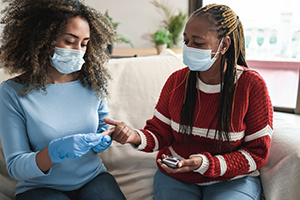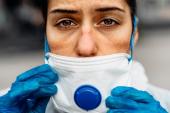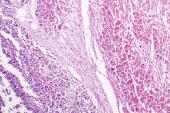COVID-19: TCTMD’s Dispatch for November Week 2
We’re curating a list of COVID-19 research and other useful content, and updating it regularly.

Since March 2020, TCTMD reporter Todd Neale has been writing up breaking news and peer-reviewed research related to COVID-19 every weekday. In July 2021, we transitioned to Mondays, Wednesdays, and Fridays. If you have something to share, tell us. All of our COVID-19 coverage can be found on our COVID-19 Hub.
November 12, 2021
Even as COVID-19 case numbers decline across much of the globe, they continue to rise in western Europe, the Associated Press reports: “The World Health Organization said coronavirus deaths rose by 10% in Europe in the past week, and an agency official declared last week that the continent was ‘back at the epicenter of the pandemic.’ Much of that is being driven by spiraling outbreaks in Russia and eastern Europe—where vaccination rates tend to be low—but countries in the west such as Germany and Britain recorded some of the highest new case tolls in the world.”
And across the Atlantic Ocean, “the contagious Delta variant is driving up COVID-19 hospitalizations in the Mountain West and fueling disruptive outbreaks in the North, a worrisome sign of what could be ahead this winter in the US,” according to the AP. “We’re going to see a lot of outbreaks in unvaccinated people that will result in serious illness, and it will be tragic,” one expert predicted.
 The rising number of people with diabetes in Africa is exacerbating the COVID-19 situation on the continent, according to the World Health Organization (Reuters). “A WHO analysis of data from 13 African countries found a 10.2% case fatality rate in COVID-19 patients with diabetes, compared with 2.5% for COVID-19 patients overall.” A WHO official said “fighting the diabetes epidemic in Africa is in many ways as critical as the battle against the current pandemic.”
The rising number of people with diabetes in Africa is exacerbating the COVID-19 situation on the continent, according to the World Health Organization (Reuters). “A WHO analysis of data from 13 African countries found a 10.2% case fatality rate in COVID-19 patients with diabetes, compared with 2.5% for COVID-19 patients overall.” A WHO official said “fighting the diabetes epidemic in Africa is in many ways as critical as the battle against the current pandemic.”
Following a recommendation from the human medicines committee of the European Medicines Agency (EMA), the European Commission on Friday authorized the use of two monoclonal antibody therapies for COVID-19—casirivimab/imdevimab (Ronapreve) and regdanvimab (Regkirona). The combo can be used either to treat COVID-19 in patients who do not require supplemental oxygen and who are at risk for progressing to severe disease or to prevent COVID-19. Regdanvimab can be used to treat adults with COVID-19 who do not require supplemental oxygen and who are at risk for progressing to severe disease.
Phase III results published in the Lancet show that the BBV152 Bharat Biotech COVID-19 vaccine from India—given as a two-dose series—is 77.8% effective against symptomatic infection. CIDRAP News notes that the WHO added the vaccine, which can be stored at normal freezer temperatures, to its list of shots approved for emergency use last week. “The rollout of BBV152 might ease the ultra-cold chain requirements of other SARS-CoV-2 vaccine platforms, increase the finite global manufacturing capacity, and improve insufficient supply of vaccines which disproportionately affects low-income and middle-income countries,” researchers write in an accompanying commentary.
Three in five COVID-19 patients with STEMI who require mechanical circulatory support will die in the hospital, according to observational data spanning 16 months of the pandemic, and a researcher said that that information can be used guide informed consent and decision-making. TCTMD’s Caitlin Cox has more on the findings from the North American COVID-19 Myocardial Infarction (NACMI) registry, which were presented as a moderated poster during last week’s TCT 2021 meeting in Orlando, FL.
Consistent with findings from the RECOVERY trial published earlier this year, use of dexamethasone was associated with a 56% lower risk of death or ICU admission among hospitalized patients with COVID-19 in an observational study presented at the Society for Endocrinology annual conference in Edinburgh, Scotland (CIDRAP News). The study additionally showed that the corticosteroid is safe to use in patients with diabetes, despite some short-term worsening of the condition, if they’re monitored for complications.
 Physicians should be vaccinated against COVID-19, the CMAJ argues. Those pushing back against vaccination “are undermining public confidence in the safety and effectiveness of SARS-CoV-2 vaccines and putting patients and healthcare colleagues at risk,” according to an editorial. “Provincial health ministries should be enforcing mandatory vaccination requirements for healthcare workers. Physicians who refuse SARS-CoV-2 vaccination and do not have a valid medical exemption should be barred from conducting in-person practice.”
Physicians should be vaccinated against COVID-19, the CMAJ argues. Those pushing back against vaccination “are undermining public confidence in the safety and effectiveness of SARS-CoV-2 vaccines and putting patients and healthcare colleagues at risk,” according to an editorial. “Provincial health ministries should be enforcing mandatory vaccination requirements for healthcare workers. Physicians who refuse SARS-CoV-2 vaccination and do not have a valid medical exemption should be barred from conducting in-person practice.”
Moderna defended its COVID-19 vaccine this week, pointing to fewer breakthrough cases compared with the shot from Pfizer/BioNTech and saying that the protection against severe disease, hospitalization, and death outweighs potential risks of myocarditis, CNBC reports. The US Food and Drug Administration (FDA) recently said it needs more time to decide whether to allow use of Moderna’s vaccine in adolescents, citing the myocarditis issue.
A systematic review and meta-analysis in JAMA Network Open digs into how socioeconomic status plays into the racial/ethnic disparities that have been observed in COVID-19 outcomes in the United States. Black, Hispanic, and Asian American individuals are more likely to test positive for SARS-CoV-2 and to be admitted to the ICU, but have lower mortality rates, compared with their white counterparts. “Socioeconomic disparity and clinical care quality were associated with COVID-19 mortality and incidence in racial and ethnic minority groups.”
 SARS-CoV-2 is widespread in white-tailed deer in the United States, with recent research suggesting that the animals could become a reservoir for the virus, NPR reports. “If that's the case, it would essentially dash any hopes of eliminating or eradicating the virus in the US—and therefore from the world,” a researcher said.
SARS-CoV-2 is widespread in white-tailed deer in the United States, with recent research suggesting that the animals could become a reservoir for the virus, NPR reports. “If that's the case, it would essentially dash any hopes of eliminating or eradicating the virus in the US—and therefore from the world,” a researcher said.
November 8, 2021
On Sunday, Japan had no daily COVID-19 deaths recorded for the first time since August 2, 2020 (Reuters). Numbers of cases and deaths have fallen markedly in the country since a Delta-driven peak in August. “To gird against a possible rebound this winter, the government plans to start booster vaccine shots next month and is working to secure pill-based treatments for milder cases to reduce hospitalizations.”
Meanwhile, other parts of the world continue to wrestle with high numbers of infections. A Reuters analysis that found global COVID-19 cases have now topped 250 million also showed that infections are at record levels in eastern Europe. The daily tally of new cases hit a new high in Russia (AP), where officials have bemoaned a low vaccination rate, and Romania, where leading religious figures have stoked antivaccine sentiment, now has the world’s highest COVID-19 death rate (New York Times). Also in Europe, Germany reported the highest 7-day average rate of infections (201.1 per 100,000 people) since the beginning of the pandemic (AP). Though the latter figure is “still a lower rate than in several other European countries, it has set alarm bells ringing.”
 Relaxed rules for international visitors from numerous countries—including Canada, Mexico, and much of Europe—to the United States went into effect on Monday, “setting the stage for emotional reunions nearly 2 years in the making and providing a boost for the airline and tourism industries decimated by the pandemic,” the Associated Press reports. Travelers by air will still need proof of vaccination and a negative COVID-19 test, whereas those coming across land borders from Mexico or Canada will need only proof of vaccination.
Relaxed rules for international visitors from numerous countries—including Canada, Mexico, and much of Europe—to the United States went into effect on Monday, “setting the stage for emotional reunions nearly 2 years in the making and providing a boost for the airline and tourism industries decimated by the pandemic,” the Associated Press reports. Travelers by air will still need proof of vaccination and a negative COVID-19 test, whereas those coming across land borders from Mexico or Canada will need only proof of vaccination.
Regeneron’s cocktail of two monoclonal antibodies—REGEN-COV, containing casirivimab and imdevimab—reduced the risk of developing COVID-19 in uninfected individuals by 81.6% between months 2 and 8 of follow-up in a phase III trial, matching the 81.4% risk reduction previously reported at 1 month, the company announced Monday. The therapy “is currently authorized in the United States to treat people with mild-to-moderate COVID-19 and for prevention of infection in those exposed to infected individuals, and others at high risk of exposure in settings such as nursing homes or prisons,” Reuters notes.
A study in JAMA Internal Medicine suggests “that persistent physical symptoms after COVID-19 infection may be associated more with the belief in having been infected with SARS-CoV-2 than with having laboratory-confirmed COVID-19 infection.” The authors say “further research in this area should consider underlying mechanisms that may not be specific to the SARS-CoV-2 virus. A medical evaluation of these patients may be needed to prevent symptoms due to another disease being erroneously attributed to ‘long COVID.’”
A measure requiring proof of COVID-19 vaccination for entry into various types of businesses—including restaurants, malls, theaters, and salons—took effect today in Los Angeles, the Associated Press reports. The city “is among a growing number of cities across the US, including San Francisco and New York City, requiring people show proof of vaccination to enter various types of businesses and venues. But rules in the nation’s second-most-populous city, called SafePassLA, apply to more types of businesses and other indoor locations including museums and convention centers.”
Costa Rica has become one of the first countries to require COVID-19 vaccination for all children ages 5 and older, adding the shots to a list of other mandated vaccines (like those for polio and smallpox), Reuters reports: “So far, nearly three-quarters of the country’s 12- to 19-year-olds have received at least one vaccine dose, while about 54% of all Costa Ricans have been fully vaccinated.”
In an opinion piece recently published in the New York Times, Ezekiel Emanuel, MD, PhD, discusses possible explanations for why men are more likely than women to die of COVID-19. Some have suggested it’s the lower vaccination rates, whereas others have suggested it is a “spurious” finding, he notes. Other factors potentially at play include differences in adherence to wearing masks, in underlying health conditions, in work status, and in immune responses or hormonal factors. “Still,” Emanuel writes. “the reasons men seem to fare worse remain mostly a mystery.”
On Friday, interim recommendations for use of the COVID-19 vaccine from Pfizer/BioNTech in children ages 5 to 11 from the Advisory Committee on Immunization Practices (ACIP), which provides guidance to the US Centers for Disease Control and Prevention (CDC), were published in Morbidity and Mortality Weekly Report. The CDC last week accepted the group’s recommendation for vaccination in this age group, and shots started being administered shortly thereafter.
 In animal news, the first two spotted hyenas known to have COVID-19 have been detected at the Denver Zoo, according to the New York Times. So far, their symptoms have been mild, and they are “in good shape and improving,” a zoo spokesperson said. And a study published last week in VetRecord describes the possible link between SARS-CoV-2 infection and myocarditis in pet cats and dogs.
In animal news, the first two spotted hyenas known to have COVID-19 have been detected at the Denver Zoo, according to the New York Times. So far, their symptoms have been mild, and they are “in good shape and improving,” a zoo spokesperson said. And a study published last week in VetRecord describes the possible link between SARS-CoV-2 infection and myocarditis in pet cats and dogs.
Todd Neale is the Associate News Editor for TCTMD and a Senior Medical Journalist. He got his start in journalism at …
Read Full Bio





Comments